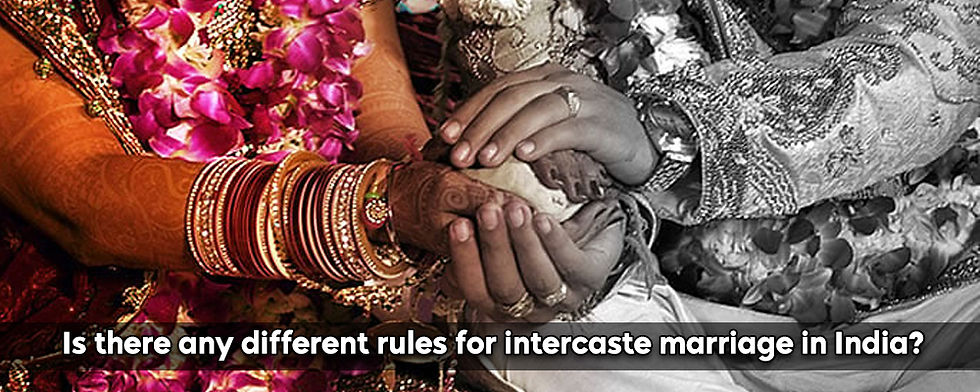Is There Any Different Rules For Intercaste Marriage In India?
- leadindia831
- Jul 28, 2023
- 3 min read
In India, inter-caste unions are still relatively rare, and news stories frequently feature these unions and the associated violence. The caste system, which functions in a very brutal way, has plagued the intricate Indian civilization.
Being hereditarily superior and "pure" to others is a prevalent idea in the caste system (prescribed Varna). Thus, the practice of inter-caste marriage ensures that the hierarchy remains intact and that violence is perpetrated against the Dalit or people who belong to the so-called "lower caste" in the situation that it is violated.
Rules for Inter-Caste Marriage in India
The government has set an age limit for marriage, although it is regarded as a social standard to marry beyond a particular age. One of many human rights is the right of an adult to select their own marriage. Hindu marriage regulations are relevant since the hierarchy of castes is a concept that is primarily related to that religion. The courts have repeatedly ruled that the approval of friends or family is not necessary for two adults to get married.
In India, inter-caste marriages are legally permitted and protected under the Special Marriage Act, 1954. The rules and provisions related to inter-caste marriages in India are as follows-
Special Marriage Act- Inter-caste couples can choose to marry under the provisions of the Special Marriage Act, which allows individuals from different castes, religions, or backgrounds to solemnise their marriage. The act provides a legal framework for inter-caste marriages and governs the registration and recognition of such marriages.
Notice of Intended Marriage- Both parties must give a notice of their intention to marry to the Marriage Registrar in their respective districts. This notice is displayed publicly for 30 days to allow objections, if any. After the stipulated waiting period, the marriage can be solemnised.
Consent and Age- Both parties must be of legal marriageable age, which is 18 years for the bride and 21 years for the groom. The marriage requires the free and informed consent of both individuals.
Witness Requirements- The presence of at least three witnesses is required during the marriage ceremony. These witnesses can be family members, friends, or other individuals who can testify to the solemnization of the marriage.
No Discrimination- The Special Marriage Act explicitly prohibits discrimination based on caste, religion, or ethnicity. It ensures that inter-caste marriages are treated equally under the law, and individuals cannot be subjected to any legal consequences or restrictions solely based on their caste or religion.
Registration of Marriage- After the marriage ceremony, the couple needs to register their marriage with the Marriage Registrar within the prescribed timeframe. The registration provides legal recognition to the inter-caste marriage.
Procedure for Inter-Caste Marriages
The Special Marriage Act does not require luxury, ceremony, or spectacle like ordinary marriages do. According to this Act, a marriage just needs to have the consent of both spouses to be recognized as legal. It will work if both parties are ready to get married.
Following are the steps for registration and getting married according to the Special Marriage Act-
A formal application must be submitted to the district registrar of marriage in the area where either of the party has lived for the past 30 days.
The marriage registrar provides both parties a 30-day notice before evaluating any opposition to their marriage.
The marriage officer is expected to keep a marriage notice book that includes all the information about the prospective union if there are no objections. After 30 days have passed since the notification was posted at the marriage commissioner's office, if there are no further objections, the marriage may be solemnised.
The marriage officer's recording of every pertinent detail in the marriage notice book must be acknowledged by the couple and three witnesses.
You will need the help of lawyers for the registration of your inter-caste marriages following every rule and provision under the Special Marriage Act. If you need the help of lawyers to solemnise your inter-caste Court marriage in Ghaziabad, then lawyers in Ghaziabad can be employed, and if you need the help of lawyers to solemnise your inter-caste Court marriage in Delhi, then lawyers in Delhi can be employed. Similarly, the lawyers in Delhi can also assist you in knowing about the Court marriage process in Delhi for inter-caste couples there.
You can talk to a lawyer at Lead India for any kind of legal advice. In India, free legal advice online is available. Along with free legal advice online you can ask a legal question to experts online free in Lead India.
Visit us: https://www.leadindia.law
Call Us: +91–8800788535
Email: care@leadindia.law
Facebook: https://www.facebook.com/leadindialaw
Twitter: https://twitter.com/leadindialaw
Pinterest: https://in.pinterest.com/lawleadindia




Contact the best matrimonial lawyers in Jodhpur for best inter-caste marriage lawyers in Jodhpur